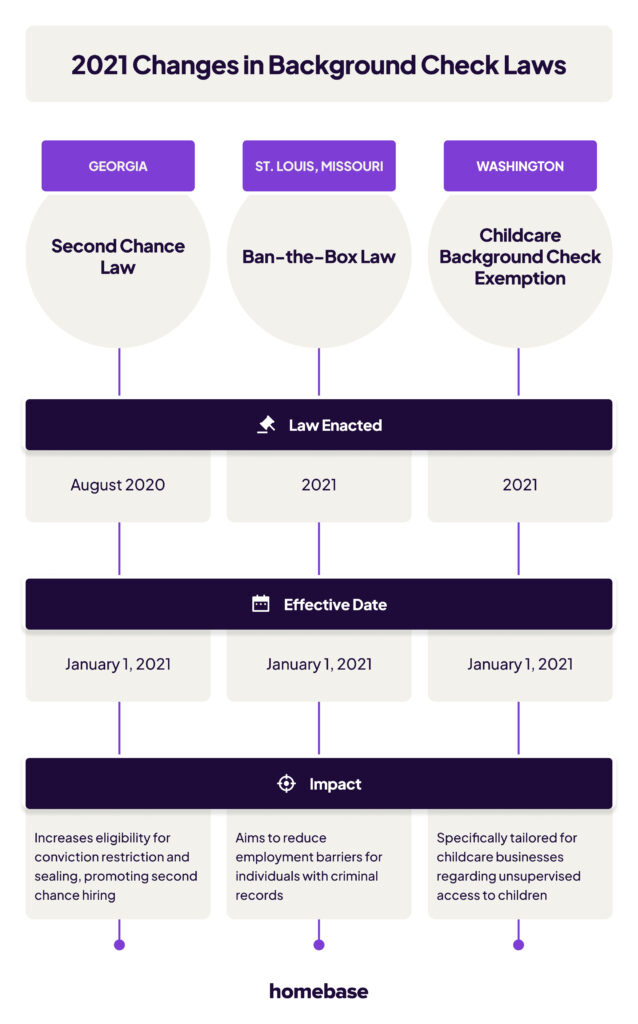Before making a hiring decision for your business, you may consider looking into each candidate’s criminal history information. However, there are employment laws in place in states across the country, from New York to California, that prevent private employers from looking into an applicant’s credit or criminal records to avoid discrimination against convicted felons.
In fact, most states—and some cities—have laws in place either allowing criminal background checks or forbidding them in some way during the job application process. There are also state laws that apply to employers in certain industries and require them to conduct employment background checks on their applicants.
Georgia, St. Louis, and Washington updated their existing background check laws in 2021. But if you live in another state, you most likely have rules already in place preventing and/or requiring background checks. This article is not legal advice, so be sure to check our state labor law guides to see what the rules are in your area.
3 states that changed background check laws in 2021

Georgia
Gov. Brian Kemp signed the “Second Chance Law” August 2020, which extends their background check law to allow more Georgians to restrict and seal criminal conviction records for certain misdemeanor and felony convictions. The law prohibits employers from viewing these records when they conduct a criminal background check.
The previous law only allowed Georgians to request the sealing and restriction of records that did not result in conviction. They could also request misdemeanor records that occurred before the individual turned 21.
The new bill removes the age limitation for most criminal offenses. Individuals can petition the court to restrict and seal up to 2 misdemeanor convictions from their record. They may also request to have any pardoned offenses removed from their record, as long as they were not serious violent felonies or sexual offenses.
The new law adds protections if you decide to employ a candidate with a criminal history. This aims to encourage employers to participate in second chance hiring.
The law takes effect January 1, 2021. Learn more about eligibility for conviction restriction and sealing here.
While no changes were made to their criminal background check requirements in 2021, if your business falls under the following industries, you must conduct one:
- Adult day
- Assisted living
- Home health
- Hospice
- Intermediate care homes
- Nursing homes
- Personal care homes
- Private home care
St. Louis, Missouri
St. Louis many states in the US and implemented a “ban-the-box” law in 2021. The law prohibits employers from making any hiring or promotion decisions based on someone’s criminal history. The law affects employers with at least 10 team members and took effect January 1, 2021.
Employers also may not exclude applicants with a criminal history on their job postings. They almost may not use exclusionary language on applications or other hiring forms used in the hiring process. Applicants may only be asked about their criminal background after the employer has interviewed them and determined they are qualified for the role.
If an employer wants to ask an applicant about their criminal history, they must ask all final candidates.
Washington
Although Washington has a ban-the-box law that prohibits employers from asking applicants about their criminal history before determining that they are qualified for the job, childcare businesses are exempted from the law.
The state requires childcare businesses to conduct background checks on anyone “who is authorized to care for or have unsupervised access to children in early learning programs.”
The new law prohibits these employers from denying employment if an applicant’s background check reveals an instance of child abuse or neglect and the individual has since obtained a certificate of parental improvement. The law took effect January 1, 2021.
Federal background check rules and laws to know
Along with following state and local laws on background checks, you also have to be aware of the federal laws: the US Fair Credit Reporting Act requires you to do a few things before getting information:
- Inform the individual in writing—but not in the application—that you might use the information for employment decisions.
- If you conduct an “investigative report,” inform the individual about their right to an investigation description.
- Get written permission from the individual to do the background check.
- Certify to the third party that you obtained permission from the individual. You must also certify that you followed FCRA requirements.
Need help applying these laws to your business?
Check out our HR and Compliance services to see how Homebase can help you understand and make it easier to follow state and federal employment legislation.

